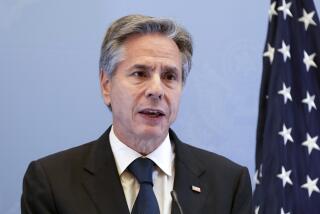Iran sanctions remain despite nuclear deal, U.S. officials say
WASHINGTON — Obama administration officials insisted to a Senate panel Tuesday that a temporary deal meant to curb Iran’s nuclear program is not about to destroy restraints on world trade with Tehran.
At a hearing of the Senate Foreign Relations Committee, the administration’s top negotiator with Iran and its senior sanctions officials acknowledged that the Nov. 24 interim agreement with Tehran has set off a surge of contacts between Western corporations and officials of the long-isolated Iranian economy.
Business executives from Britain, Canada, Germany and Italy have visited Tehran in recent weeks, and a French delegation that arrived Monday included 100 potential investors.
But the U.S. officials said the international economic sanctions that have crippled Iran’s economy over the last few years remain in place. They said the business delegations are maneuvering to be first in line if an agreement someday makes it possible to resume sales and services in a country of 76 million people with a taste for Western imports.
Foreigners are visiting “to see what might come in the future,” said David Cohen, a Treasury Department undersecretary. “They’re not looking to do business today.”
The temporary agreement, which took effect Jan. 20, places some curbs on Iran’s nuclear program in exchange for a temporary easing of some sanctions. The deal is aimed at providing six months to one year for Iran and six world powers to try to negotiate a deal that would set longer-term curbs on its nuclear development.
Many nations suspect that Iran, despite its denials, is seeking a nuclear weapons capability.
Critics of the deal contend that the interim arrangement has shifted the psychology of world markets toward Tehran and is building up pressure for business deals that could rupture the international sanctions program.
Sen. Jim Risch (R-Idaho) said that because some sanctions have been relaxed, America’s European partners “are now flooding in there with businesspeople … going back to business as usual with the Iranians.”
U.S. officials responded that the sanctions are firm and they are emphasizing that they are willing to impose tough punishment on foreign companies that break the rules.
“We have not seen deals being done,” Cohen said. “There’s very little economic potential today in the Iranian business sector.”
He said U.S. officials “are as crystal clear as possible in all of our engagements that if these [business] talks turn into something more, if these talks turn into deals that violate the elaborate sanctions that remain in place, that we will take action” to punish them.
Undersecretary of State Wendy Sherman, the chief U.S. negotiator with Iran, said the Western contacts, though discouraged by Washington, are raising expectations among Iranians in a way that builds pressure on the government in Tehran to deliver a nuclear deal.
“Those who go raise hopes that the [Hassan] Rouhani administration’s going to have to deliver on,” Sherman said, referring to the Iranian president.
Some senators, worrying that the yet-to-be-negotiated final agreement will be too easy on Iran, pushed Sherman to commit to tough demands.
Sen. Robert Menendez (D-N.J.), the Foreign Relations Committee chairman, pressed Sherman on whether she would demand that Iran close its bomb-resistant underground enrichment facility at Fordow and remove most of the nation’s 20,000 centrifuges, which are used to enrich uranium.
Sherman rebuffed those demands, saying she didn’t want to publicly lay out U.S. negotiating positions for the Iranians before the negotiations begin
She dismissed Rouhani’s recent statement that Iran would never agree to get rid of any centrifuges. That talk, she said, was “for domestic consumption” in Iran and to set a “maximalist” position going into negotiations.
Although some U.S. critics have insisted that nothing short of dismantling Iran’s nuclear infrastructure will suffice in a final agreement, Sherman said that would not prevent the Iranians from later rebuilding their equipment if they choose to do so.
“They cannot unlearn what they know,” she said. “So they would be able to reconstitute an enrichment program. They would be able to reconstitute their research and development.”
The six powers that have been negotiating with Iran — the United States, Britain, France, Russia, China and Germany — are scheduled to begin their next round Feb. 18 in Vienna. Although the interim deal is for six months, officials acknowledge privately that the talks are likely to extend to a full year, as would be allowed under the Nov. 24 agreement.
More to Read
Start your day right
Sign up for Essential California for news, features and recommendations from the L.A. Times and beyond in your inbox six days a week.
You may occasionally receive promotional content from the Los Angeles Times.






